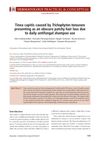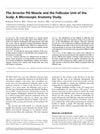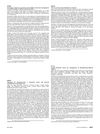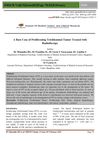 2 citations,
March 2020 in “Skin”
2 citations,
March 2020 in “Skin” Using cidofovir cream for a rare skin disease can cause skin darkening.
 2 citations,
April 2018 in “Journal of Investigative Dermatology”
2 citations,
April 2018 in “Journal of Investigative Dermatology” The conclusion is that differentiating wound types in RDEB patients is important for clinical trials and understanding the disease.
 2 citations,
April 2015 in “Dermatology practical & conceptual”
2 citations,
April 2015 in “Dermatology practical & conceptual” Daily use of antifungal shampoo can hide symptoms and make it hard to diagnose fungal scalp infections.
[object Object]  2 citations,
January 2014 in “Springer eBooks”
2 citations,
January 2014 in “Springer eBooks” The book details skin conditions in older adults, their link to mental health, cancer treatment importance, hair loss remedies, and managing autoimmune and itchy skin.
 2 citations,
December 2013 in “Veterinary dermatology”
2 citations,
December 2013 in “Veterinary dermatology” Three dogs with a rare skin condition improved with treatment.
 2 citations,
July 2013 in “Veterinary dermatology”
2 citations,
July 2013 in “Veterinary dermatology” Dog skin with hair loss, when transplanted to mice, regrew hair, suggesting the hair loss cause is likely body-wide, not skin-specific.

Afro-textured hair is more fragile and prone to certain scalp conditions, requiring careful treatment and more research for effective management.
 2 citations,
January 2011 in “Elsevier eBooks”
2 citations,
January 2011 in “Elsevier eBooks” Early treatment of acne is crucial to prevent scarring and psychological effects.
 2 citations,
January 2005 in “Elsevier eBooks”
2 citations,
January 2005 in “Elsevier eBooks” The document describes skin diseases affecting the outer ear in dogs and cats, their spread to other body parts, and treatment options.
 2 citations,
January 2004 in “Elsevier eBooks”
2 citations,
January 2004 in “Elsevier eBooks” Lupus affects the skin in various ways, and proper skin examination is crucial for diagnosis and treatment.
 2 citations,
September 2002 in “Dermatologic Surgery”
2 citations,
September 2002 in “Dermatologic Surgery” Each group of hair follicles on the scalp shares one muscle that helps control hair movement.
 1 citations,
October 2023 in “Romanian Journal of Morphology and Embryology”
1 citations,
October 2023 in “Romanian Journal of Morphology and Embryology” COVID-19 can cause various skin issues, but long-term skin problems are rare.
 1 citations,
June 2020 in “bioRxiv (Cold Spring Harbor Laboratory)”
1 citations,
June 2020 in “bioRxiv (Cold Spring Harbor Laboratory)” Fetal skin has unique immune cells different from adult skin.
 1 citations,
October 2018 in “InTech eBooks”
1 citations,
October 2018 in “InTech eBooks” The document concludes that treatments for cicatricial alopecia are not well-supported by evidence, but hair transplantation shows more predictable and satisfactory results.
 1 citations,
May 2018 in “The journal of investigative dermatology/Journal of investigative dermatology”
1 citations,
May 2018 in “The journal of investigative dermatology/Journal of investigative dermatology” The symposium highlighted the importance of understanding disease mechanisms for targeted dermatology treatments.
 1 citations,
January 2017 in “Springer eBooks”
1 citations,
January 2017 in “Springer eBooks” The document explains how hair follicles develop, their structure, and how they grow.
 1 citations,
January 2016 in “Open Forum Infectious Diseases”
1 citations,
January 2016 in “Open Forum Infectious Diseases” Retinoic acid is not linked to hair loss from fluconazole use.
 1 citations,
March 2014 in “Journal of The American Academy of Dermatology”
1 citations,
March 2014 in “Journal of The American Academy of Dermatology” Hair care practices and concerns about maintaining hairstyles can reduce how often African American women exercise.
[object Object]  1 citations,
January 2014 in “Hair therapy & transplantation”
1 citations,
January 2014 in “Hair therapy & transplantation” Platelet-rich plasma treatment is not very effective for chronic severe alopecia areata.
 1 citations,
June 2012 in “Actas Dermo-Sifiliográficas”
1 citations,
June 2012 in “Actas Dermo-Sifiliográficas” Early and aggressive treatment of scarring alopecia is important to prevent further hair follicle damage.
 1 citations,
March 2004 in “Journal of The European Academy of Dermatology and Venereology”
1 citations,
March 2004 in “Journal of The European Academy of Dermatology and Venereology” Hair loss improved with treatment and successful transplant.
 1 citations,
May 2002 in “British Journal of Dermatology”
1 citations,
May 2002 in “British Journal of Dermatology” Hair loss caused by longer latent hair cycle and sudden miniaturization, not gradual follicle size reduction.
 1 citations,
March 1992 in “Postgraduate Medicine”
1 citations,
March 1992 in “Postgraduate Medicine” About 40% of women by age 60 experience significant hair loss, often due to androgenetic alopecia, with treatments like minoxidil available and hope for future cures.
 April 2024 in “Acta scientific dental sciences”
April 2024 in “Acta scientific dental sciences” Improving oral hygiene and quitting smoking can resolve black hairy tongue.

Herbal remedies might help with hair loss but need more research for safety and effectiveness.
 February 2024 in “Journal of medical science and clinical research”
February 2024 in “Journal of medical science and clinical research” Radiotherapy effectively treated a large scalp tumor in an elderly woman, avoiding surgery.
 January 2024 in “American journal of clinical dermatology”
January 2024 in “American journal of clinical dermatology” Ritlecitinib is safe and well-tolerated for treating alopecia areata in patients aged 12 and older.
 January 2024 in “Uttar Pradesh journal of zoology”
January 2024 in “Uttar Pradesh journal of zoology” Chemical treatments severely damage hair cuticles, especially in previously treated hair.

A rare case of a benign hair follicle tumor with unusual skin changes highlights the need for timely diagnosis to prevent potential cancer.
 November 2023 in “bioRxiv (Cold Spring Harbor Laboratory)”
November 2023 in “bioRxiv (Cold Spring Harbor Laboratory)” Disrupted cholesterol production impairs hair follicle stem cells, leading to hair loss.





























